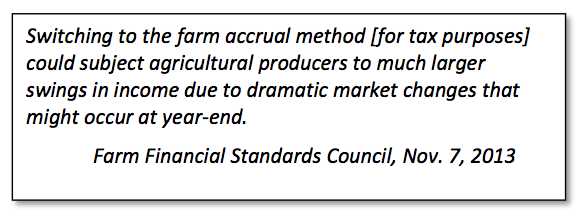
What is it and Why is it Important?
“Cash” Versus “Accrual” Method of Accounting
Under the cash method of accounting, revenue only becomes taxable after an entity has actually received money or income, and expenses are only accounted for after money has actually been paid out.
Conversely, the accrual method of accounting accounts for revenue when it is earned (regardless of whether the taxpayer has actually received payment or not), and expenses goods and services when they are incurred irrespective of whether they have actually been paid out. The cash method of accounting is widely used in agriculture and provides many benefits to producers.
Cash Accounting Preserved for Farmers
In recent years, Congressional taxwriting committee leadership advanced proposals that sought to require farm operations to use accrual accounting if they exceeded certain annual gross receipts thresholds. Fortunately, due largely to the efforts of Farmers for Tax Fairness, these initiatives have been shelved and the comprehensive tax reform legislation that was enacted into law in 2017 (the “Tax Cuts and Jobs Act” (Pub. L. 115-97)), actually expanded access to cash basis accounting for small businesses rather than placing any new limits on agriculture.
Because the attack on farmers’ access to cash accounting was so soundly rejected during the tax reform debate, Farmers for Tax Fairness is in a strong position to rebuff future such assaults.
This is important because a mandated switch to accrual accounting would drive up agricultural operations’ costs and decrease their flexibility in the following ways:
- Farmers have used cash accounting for decades to balance out price volatility and to manage operations consistent with cash flow.
- Requiring agricultural operations to use the accrual method would penalize operators in an industry with widely recognized thin margins, rising production costs, and high price volatility.
- Agriculture faces high input costs and wide swings in commodity prices and the level of an operation’s gross receipts is in no way a reflection on its profitability.
- As commodity prices increase over time, a rule tied to gross receipts would become increasingly restrictive and force more farms into accrual accounting.
New Cash Accounting Threat: The Farm Syndicate Rule (FSR)
While Congressional efforts to deprive agricultural producers of access to cash accounting are now dormant, another threat to cash accounting has arisen in agriculture – the Farm Syndicate Rule.
In 1976, Congress amended the tax code to crack down on wealthy non-farmers who used contrived farm deductions to offset income. Called the “Farming Syndicate Rule,” this remains good policy today. In the process, Congress made it clear that cash accounting was to remain available to active farmers, regardless of their business structure.
Background on FSR
Congress enacted the FSR deter agricultural businesses with operating losses from the practice of selling interests in that business to sophisticated, wealthy passive “investors” who have nothing to do with farming, but who have taxable income to shelter. Deemed “farming syndicates,” these tax shelters are barred from using cash-basis accounting. However, Congress carved out exceptions to the FSR that allow certain individuals, families, and entities legitimately and directly engaged in agricultural enterprises to use cash accounting. This “active participation” exception applies to any interest that is attributable to the taxpayer’s active participation in the management of a farming business.
As a general rule, a partnership in the business of farming is a farming syndicate if it allocates more than 35 percent of any losses to limited partners. However, when calculating the 35 percent allocation, the interest of any individual who has actively participated in the management of the farm does is not included in that calculation.
However, the IRS is currently twisting their interpretation of this statute to try to deprive some legitimate active farmers of their access to cash accounting.
The seminal case on this issue, Burnett Ranches, Ltd. v. United States, 753 F.3d 143 (5th Cir. 2014), turned on whether the managing owner of a ranching operation qualified for the active participation exemption – and therefore had access to cash-basis accounting – or whether her interest failed to meet the definition under the law.
Burnett Ranches
Burnett Ranches involved a family-owned, working livestock ranch that had been operated continuously by the same family for more than 150 years. Burnett Ranches, Ltd. was a limited partnership engaged in the business of farming and used cash accounting. Burnett Ranches, Inc. was an S corporation that owned a 99% interest in Burnett Ranches, Ltd. This S Corporation, which did not independently carry on a farming business, was owned by a single individual who ran the farm. Her active farm participation was not in dispute.
The IRS sued Burnett Ranches, Ltd., arguing that it was a farming syndicate because the active farmer did not directly own the working farm. Rather, she owned the S-corporation that owned the working farm, meaning her “interest” in the partnership was not held by the individual who farmed it; it was held indirectly. The IRS read the law to require the active participation exemption be applied only to a direct, legal “interest” in a farming partnership.
The Fifth Circuit Court of Appeals disagreed with the IRS. It concluded that an individual who participated in the management of farming operations comes within the “active participation exception” irrespective of the fact that the legal title of that person’s attributable interest was held in the name of her wholly owned S corporation, rather than in her own name. Her “interest” did not need to be a legal interest in the form of direct farm ownership.
In February of 2017, the IRS announced that it was refusing to accept this result. It issued an “Action on Decision” that indicated it will only follow the Fifth Circuit’s decision within the Fifth Circuit (Texas, Louisiana, Mississippi), meaning it intends to relitigate this matter somewhere else – presumably in a less agriculture-friendly jurisdiction and with a less sympathetic defendant, to try to win on this issue and potentially set up a disagreement between circuits.
Implications
For farming operations with partnership structures akin to Burnett Ranches, Ltd. – a very common farm ownership structure in the US – a decision favorable to the IRS on this question would deliver a massive financial blow, both in terms of loss of cash accounting and litigation expense, with no policy justification. The FSR was never intended to deny cash accounting to legitimate, active farmers, but IRS’ interpretation of the law would do just that, in contravention of congressional intent and sound public policy. That is way clarifying language, which reaffirms Congress’ initial intent but does not weaken the farming syndicate rule or widen its longstanding exemptions, is needed.
This change has the potential to impact certain:
- Feedlots
- Dairies
- Large grain producers
- Hog farms
- Beef operations
- Fruit, nut, and specialty crop producers
Summary of Consequences of Denying Cash Accounting to US Agriculture
- Income may be subject to tax before cash is received.
- Cash expenditures may not reduce taxable income.
- Increased level of debt needed to buy inputs and pay taxes. Both will take cash under the accrual method, it will not be one cash outflow or the other.
- Increased volatility in income reported from year-to-year leads to increased tax filings in loss years.
- Increased record keeping for some producers.
- Increased risk for businesses during tough economic times. There will be less working capital and equity in the business due to paying taxes in the “good” years.
- Once triggered, a taxpayer would be ineligible to switch back to cash accounting under “automatic consent” for a period of five years. See Rev. Proc. 2011-14, Sec. 4.02(6)).
In the News
Farmers and Ranchers Call on Congress and the Trump Administration to Repeal Harmful IRS Ruling
September 19, 2019 - (Washington, DC) In a letter to Congress today, 28 of America’s leading agricultural businesses and associations called for the repeal of an IRS opinion that threatens the livelihoods of thousands of farm and ranch operations nationwide. The...
read moreFarmers for Tax Fairness Applauds House Tax Reform Bill
Bill Does Not Restrict the Ability of Farmers and Ranchers to Use Cash Accounting (Nov. 2, 2017) – Farmers for Tax Fairness, a national coalition of farmers and ranchers, today applauded the U.S. House of Representatives for not restricting the use of cash accounting...
read moreK·Coe Isom Applauds Congressional and White House Progress on Tax Reform Framework
Leading Ag Consulting & CPA Firm Calls on Congress to Shape Tax Reform to Boost U.S. Agriculture (Sept. 27, 2017) – K·Coe Isom, the nation’s leading agricultural accounting and consulting firm, today applauded the U.S. House and Senate leadership and the White House...
read moreA Letter to U.S. Senate Finance
A letter to U.S. senators on tax code and access to cash accounting for agricultural businesses.
read more
